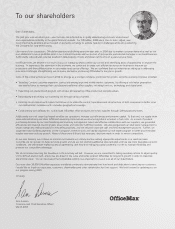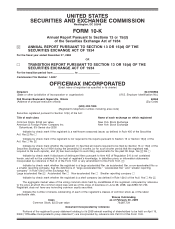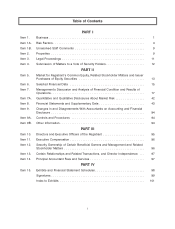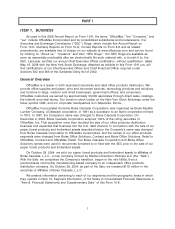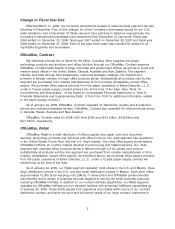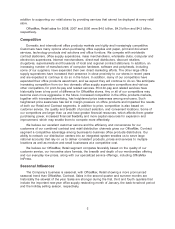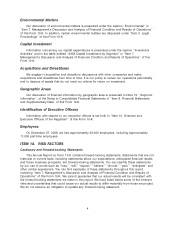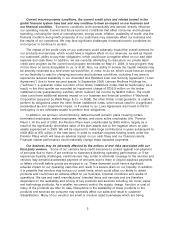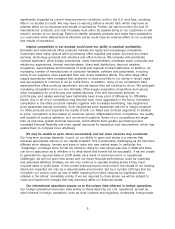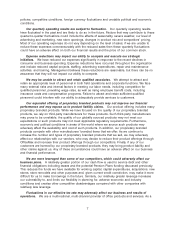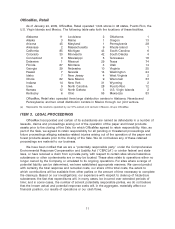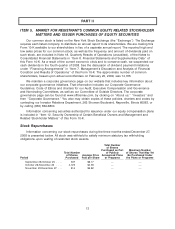OfficeMax 2008 Annual Report Download - page 9
Download and view the complete annual report
Please find page 9 of the 2008 OfficeMax annual report below. You can navigate through the pages in the report by either clicking on the pages listed below, or by using the keyword search tool below to find specific information within the annual report.Current macroeconomic conditions, the current credit crisis and related turmoil in the
global financial system have had and may continue to have an impact on our business and
our financial condition. Economic conditions, both domestically and abroad, directly influence
our operating results. Current and future economic conditions that affect consumer and business
spending, including the level of unemployment, energy costs, inflation, availability of credit, and the
financial condition and growth prospects of our customers may adversely affect our business and
the results of our operations. We may face significant challenges if macroeconomic conditions do
not improve or continue to worsen.
The impact of the credit crisis on our customers could adversely impact the overall demand for
our products and services, which would have a negative effect on our revenues, as well as impact
our customers’ ability to pay their obligations, which could have a negative effect on our bad debt
expense and cash flows. In addition, we are currently attempting to restructure our private label
credit card program as the current card program terminates on May 31, 2009. A new program may
not be done on terms acceptable to us, or at all. Also, our ability to access the capital markets may
be severely restricted at a time when we would like, or need, to do so, which could have an impact
on our flexibility to react to changing economic and business conditions, including if we were to
experience reduced availability in our Amended and Restated Loan and Security Agreement (‘‘Loan
Agreement’’) due to lower secured assets. In September 2008, Lehman Brothers Holdings Inc.
(‘‘Lehman’’), a guarantor under a portion of our timber installment notes, filed for bankruptcy. As a
result, in the third quarter we recorded an impairment charge of $735.8 million on the timber
installment note guaranteed by Lehman, which reduced net income by $449.5 million. The credit
crisis could have additional adverse impact on our business and financial condition if Wachovia
Corporation (acquired by Wells Fargo & Co. in 2008), the other timber notes guarantor, is unable to
perform its obligations under the other timber installment notes, which would result in a significant
accelerated tax and impairment impact, or if parties to our Loan Agreement are forced to file for
bankruptcy or are otherwise unable to perform their obligations.
In addition, we sponsor noncontributory defined benefit pension plans covering certain
terminated employees, vested employees, retirees, and some active employees (the ‘‘Pension
Plans’’). At the end of 2008, the Pension Plans were underfunded by $435 million, largely as a
result of the significantly diminished value of the plan assets due to the negative return on plan
assets experienced in 2008. We will be required to make large contributions in years subsequent to
2009 ($50 to $70 million in the near term) in order to maintain required funding levels under the
Pension Plans which will have an adverse impact on our cash flows and our financial results.
Financial market performance could materially change these expected payments.
Our business may be adversely affected by the actions of and risks associated with our
third-party vendors. Some of our vendors have credit insurance to protect against non-payment
of amounts due to them. If we continue to experience declining operating performance, or if we
experience liquidity challenges, credit insurers may curtail or eliminate coverage to the vendors and
vendors may demand accelerated payment of amounts due to them or require advance payments
or letters of credit before goods are shipped to us. These demands could have a significant
adverse impact on our operating cash flow and result in a severe drain on our liquidity. In addition,
it is possible that vendors may reduce our credit limits, which could affect our ability to obtain
products and could have an adverse effect on our business, financial conditions and results of
operations. We use and resell manufacturers’ branded items and services and are therefore
dependent on the availability and pricing of key products and services including ink, toner, paper
and technology products. As a reseller, we cannot control the supply, design, function or cost of
many of the products we offer for sale. Disruptions in the availability of these products or the
products and services we consume may adversely affect our sales and result in customer
dissatisfaction. Many of our vendors are small or medium sized businesses which are being
5


